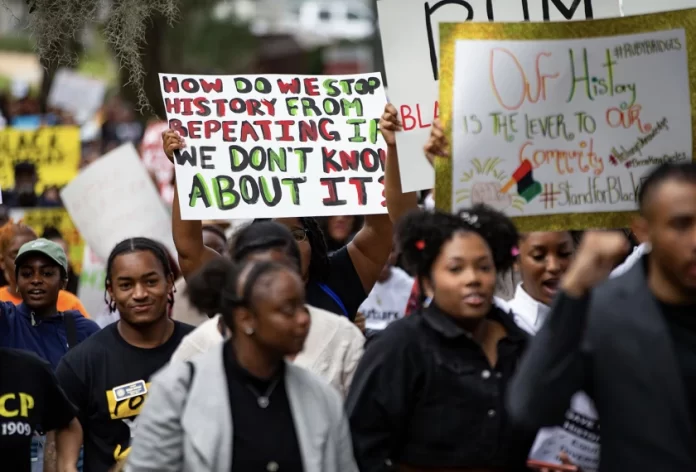It has been debated that the University of Tennessee at Martin should implement a Black history course in its curriculum because it will educate students on the knowledge of Black history, which isn’t quite taught effectively in other history courses.
UT Martin offers more than 100 different areas of study for its students to explore as they embark on their four-year journey here. The university has a diverse community. However, there are no courses that explore different cultures, which is why some faculty and students decided to create a coalition to change that. But UT Martin isn’t quite at fault here. The decision stems from the Tennessee government and its legislators.
According to the Tennessean, in 2021, Tennessee passed a law that banned the teaching of critical race theory in public schools. The term often abbreviated as C.R.T. originated during the 1970s by Derrick Bell, a law attorney who worked on many civil rights cases.
David Barber, a history professor and the creator of the People for Black History Coalition at UT Martin explained Bell’s theory. “The American legal system is fundamentally white supremacist. Systemic racism permeates our legal system. But the key thing in critical race theory is the very notion of systemic racism,” said Barber.
However, critics failed to reveal that it wasn’t being taught at schools. Barber added, “During the wake of the murder of George Floyd, the people who run this country panicked at the notion that this idea of systemic racism is going to become more widespread, more people will understand how this country really operates.” Furthermore, this will begin the origin of divisive concepts and its laws being passed in 24 states, including Tennessee, that implemented executive action to bar certain teachings. Barber explained that the term “divisive concepts” was put forward by former president Donald Trump, which became a “manufactured media crisis.”
But the main concern that many people have is how could a Black history course benefit the education system? Based on an article by Newark Trust, “All students can benefit from learning Black history. By teaching students the complete story of America’s history, they will have a deeper understanding of the society around them and be inspired to advocate for causes that align with their interests.” With that being said, many school systems aren’t educating students on factual information regarding the history of their country.
Even Africa is missing a part of its history in American education, which is that “Africans lived in complex societies from small villages to large cities that contained universities, mosques, and libraries,” according to Forbes. They didn’t show up exclusively rooted in slavery as textbooks claimed. So, history is likely not to repeat itself if people are informed of the exact truth and have challenging conversations that open discussions for change.
A study from John Hopkins University shows that most U.S. schools teach Black history, but few do it well since the coursework required emphasizes the negative aspects of African American life. The study also explained that in Baltimore, 36 percent of secondary school textbooks are about the African American experience, but the majority of them are about police brutality and incarceration.
Two students enrolled at UT Martin strongly believe that a Black history course is needed. Mmachukwu Favour Osisioma, an African American sophomore student and member of the People for Black History Coalition explained how impactful it would be if UT Martin decided to have a Black history course. “Having a Black history course at UT Martin is important because a lot of people don’t know the basics. Some even today still say, ‘Oh, the Civil War was about state rights,’ which is a very cop-out way of addressing the fact that those people wanted slavery to continue. They were not willing to see black people as people because these black people afforded them wealth. So, again, that ties into how capitalism is undeniably linked to racism but a Black history course at this school would help set people on the right track.”
Osisioma has been very open and passionate about the topic of Black history since attending one of Dr. Barber’s talks last year which made her join the coalition. She further explained that she was moved by how passionate, inviting, and challenging the atmosphere was. “A lot of people brought up how about it is a lot of water baptisms when it comes to racism, and everyone was very good at challenging those thoughts and trying to get to the roots of those problems.”
Osisioma grew up in Nigeria and was very rooted in her culture because people didn’t see color there, but when she moved to America, society was much different. She said, “When I moved here, you had to learn racism and you had to learn to accept that being a person of color meant you were less valued, less appreciated, less beautiful. All these things that you really had no control over would happen to you. I just had to accept it. When I learned that, it was important for me to learn how and why. It was also important for me to learn why this doesn’t exist in Nigeria.”
Sarah Cornwell, a white student and a senior at UT Martin, had a different upbringing than Osisioma. Cornwell grew up in Benton, Kentucky which wasn’t as diverse and hindered her from learning about the history of different cultures. “I feel like if there was more diversity in my area that it would have been taught very differently, because these people that were teaching me oftentimes had also lived in that area their entire life. Marshall County is about one of the least diverse areas that you can be in. I think if I’m remembering correctly, there was maybe two black kids in the entire school and a handful of mixed kids. Everyone else was white, maybe from Hispanic descent.”
Cornwell went to three different universities prior to attending UT Martin, most of them were in Kentucky, but she had a better experience at UT Martin as it made her start interacting with people from various racial ethnic backgrounds. She explained, “I have found people at the school that I trust and know me, and it’s kind of easier to have harder conversations with those people, but not every single student that comes onto this campus is going to find that right. I just so happened to develop a close enough connection with them that I felt safe and comfortable having difficult conversations with. Because you can read about it all day long in a book, but unless you experience it or talk to someone that has experienced it, it’s not going to make the same impact.”
She also agrees that having a Black history course implemented into UT Martin’s curriculum could be impactful to its students, adding that if she took the course, she would be interested in learning how history has played a part in affecting culture and how it is today. “A very important step for Martin to take if they do decide to implement the course, is making sure that they have someone that is well versed in all aspects of it. I think it needs to be a very conversation heavy class; however, they choose to do that. Because, like I said before, just reading stuff isn’t going to teach as well as talking to people, having open communication, and making sure that that classroom is a safe space for people to ask questions but also learn, I think is also going to be very important,” Cornwell explained.
The discussions about having a Black history course taught at UT Martin dates back to the year of 2020 when Dr. Barber put forward to the history department the need for a lower division class in African American history. However, the idea was tabled which means it was not going to be discussed and the department thought an African American studies class was needed, but not in history. Barber explained, “The way the process works is the proposal for two classes in lower division classes in African American history made by my department chair goes to the College of Humanities and Fine Arts College Curriculum Committee. The College Curriculum Committee rejected that.”
Since the rejection of the course, the College of Humanities and Fine Arts has welcomed a new dean, Dr. Bibbee. Bibbee started the position in July of last year as a dean and a history professor.
When addressing the need for a Black history course, he said, “We do have some courses right now that address the history of African Americans. I think we could even be more expansive and looking at courses that address the history of people of color, not just in the United States, but in other parts of the world. Teaching particularly history courses, but really courses across all of our departments that address diversity, contemporary social issues and issues of racism is very valuable for students to have.”
The process of getting a course implemented is very tedious as Bibbee described it and often results in unfortunate outcomes as mentioned before. “So, if a faculty member wishes to propose a course, the first step is to begin a course proposal and to present it to their home department. Every course has to be housed someplace. It has to exist in a department in a program. So, the faculty member would present it to the curriculum committee for the department. The department would then have an opportunity to evaluate the course, review the syllabus, determine its level, its rigor, its course objectives; those kinds of things that we require every course to meet, a certain academic standard.” He explained.
Bibbee also said it is important for students to learn about people different than them and see how and why things happened. So, if a Black history course does finally get implemented into UT Martin’s curriculum, students could have a chance to get educated on various topics surrounding Black history.
In addition, Dr. Barber and the People for Black History coalition had put forth efforts into petitioning throughout the years, which has garnered support from the general population of UT Martin. However, there is still work that needs to be done to get the class implemented.
If you would like to be apart of the coalition, please contact Dr. Barber (dbarber@utm.edu) for more information.


